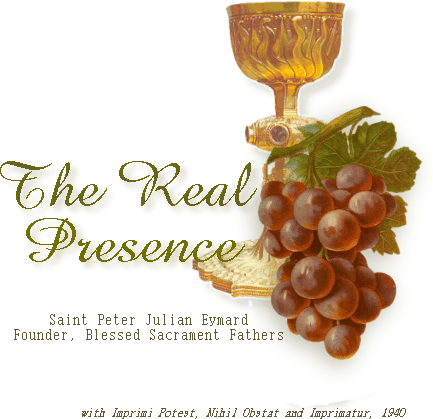 THE EUCHARIST, A NEED OF THE HEART OF JESUS Desiderio desideravi hoc Pascha manducare vobiscum. With desire I have desired to eat this Pasch with you. (Luke xxii. 15.) THE Eucharist is in excess of what was needed for the work of Redemption. It was not required of Jesus Christ by His Father's justice. The Passion and Calvary were sufficient to reconcile us with God and reopen for us the doors of our Father's home. Why then did our Lord institute the Eucharist? He instituted it for Himself, to satisfy Himself, to content His Heart. Understood in this light the Eucharist is a most divine, tender, and loving thing; goodness and overflowing tenderness are its character and nature. Even if it had been useless to us, the Eucharist was a need for our Lord, and this for three reasons. I FIRST of all because He was our Brother. Our Lord wanted to satisfy His brotherly affection for us. There is no affection more ardent, no love more expansive than a brother's love; friendship seeks a certain equality, which can really exist only among brothers. The brotherly love of Jesus surpasses anything we can think of. Scripture says that the soul of David "was knit with the soul" of Jonathan so that the two formed but one. But let the union of two men be what it may, there remains in each of them a principle of selfishness: pride. In our Lord, however, there is nothing of the kind; He loved us most purely, with no self-seeking at all. Whether we do or do not return His love, does not matter; He pursues us with still greater determination. Now, a brother likes to see his brother and to be with him; Jonathan languished when he was not with David. The thought of having to leave us was a torment for our Lord. He wanted to remain at our side to tell us: "You are My brothers!" How full of tenderness is this word! This trait of brotherhood in Jesus is the only one that invites friendship. He is the Benefactor, the Savior; but as such He does not admit of a sweet and familiar amiability. The Eucharist is the leveler that makes all men truly equal. Outside the church, dignities are in order; at the Table of Jesus, our First-born, we are all brothers. It is much to be regretted, therefore, that in our Communions we dwell only on our Lord's majesty and holiness. It is well to do this when we wish to meditate on some other mystery; but when meditating on the Eucharist, let us draw closer to it so that our relations with our Lord may be tender and expansive. II ANOTHER reason why our Lord wants to dwell in our midst is that He is our Savior. He wants to remain with us not solely to apply to us the merits of the Redemption-----there are so many other means: prayer, the Sacraments, etc.-----but to enjoy His title of Savior and His victory. A child that has been saved by its mother from a great danger is doubly loved. It was a need for our Lord, to Whom we had cost so much, to love us with a tender love in order to find compensation therein for the sufferings of Calvary. He has done so much for us! He loves us in proportion to what we have cost Him. We do not abandon those whom we have saved. Having exposed our life for them, we love them as our own life; in doing so the heart finds untold happiness. Assuredly, our Lord has at least the heart of a mother! He would have preferred leaving the Angels to abandoning us. Our Lord feels the need of seeing us again and again. Soldiers who meet one another many years after they became friends on the battlefield are at a loss how to express their joy. We undertake a long journey to see a friend, especially a childhood friend. And our Lord would not have any of these good and noble sentiments toward us? Why not? Our Lord still carries the scars of His wounds in the Eucharist. He has kept them; they are His glory and consolation. They remind Him of all the love He has had for us. What pleasure we give Him when we come to thank Him for His favors, for His sufferings! He instituted the Eucharist partly to have us come and console Him for His sorrows, His poverty, and His Cross. He begs for sympathy and for an answer to so much love. Yes, our Lord has to be with those He loves; and we are His loved ones because He has redeemed us. III LASTLY, our Lord wants to remain with us and shows us so much love in the Eucharist because His Divine Father loves us infinitely. It is a need for Him to repay His Father for us. We sometimes feel a sudden affection for someone with whom we were not acquainted and whom we had never seen before. Some feature, some recollection, some circumstance reminds us of a very dear friend. We feel kindly toward him because he is the embodiment, as it were, of a lost friend. We are also inclined to love, without knowing him, the friend of our friend, solely because he is dear to a friend of ours. It takes very little to move the heart; when we love a friend, we love instinctively all that concerns him. The same is true of Jesus. The Father loves us, and our Lord, Who loves His Father, will love us on account of Him, if it is for no other reason. This love is a need with the Son of God; He cannot forget those whom His Father loves. Let us then reverse our attitude toward our Lord and say to Him: "Oh! Of course, I am grateful to Thee for having instituted the Eucharist for my good. But, gentle Savior, Thou owest the institution of it to me. I am the occasion of it. If Thou dost enjoy therein Thy titles of Savior and Brother, it is I who am the occasion of these titles. Thou art indebted to me for being still able to do good and save souls. Thou owest to me Thy beautiful name of Brother." Moreover, our Lord is begging for adorers. His grace has sought us out. He therefore longed for us; He needed us. He must have adorers to take care of the Blessed Sacrament exposed; otherwise He will not leave His tabernacle. Holy Mass requires at least one server to represent the people, the faithful. We give our Lord the conditions of His kingship. Weigh well this thought; it will uplift and ennoble you; it will inspire you with an immense desire to love, and to remember always that rank imposes obligations-----noblesse oblige. Tell our Lord frequently with a saintly daring: "Yes, Good Master, Thou art indebted to us!"  Contact Us Contact Us HOME---------------THE HOLY EUCHARIST DIRECTORY-----------------------BLESSED SACRAMENT VISITS www.catholictradition.org/Eucharist/real-presence14.htm |